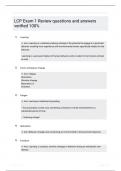Exam (elaborations)
LCP Exam 1 Review questions and answers verified 100
- Course
- Institution
LCP Exam 1 Review questions and answers verified 100% Learning Forms of behavior change Fatigue Maturation Evolution Two Major Learning Theories Pavlovian/Classical Conditioning Unconditioned stimulus Unconditioned response Conditioned stimulus Conditioned response Ivan Pavlov John B. ...
[Show more]



